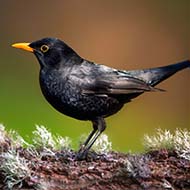
The popular songbird is in rapid decline.
Garden owners are being urged to share sightings of blackbirds in a bid to help scientists understand why they are in rapid decline.
It is hoped the Blackbirds in Gardens survey, organised by the British Trust for Ornithology (BTO), will reveal insights into how blackbirds use different types of gardens, and the impact of disease transmission on their population in the UK.
It comes as initial results from a pioneering survey, launched by the BTO in 2024, reveal a north-south divide in the decline of blackbirds. According to the results, blackbirds are faring better in the north, particularly north-west England, but continue to decline in London and, to a lesser extent the wider south east.
Scientists have attributed the decline of British blackbirds to the appearance of the Usutu virus, which was first detected in England in summer 2020. Originating from South Africa, the mosquito-borne virus has been linked to climate change and is spread by native UK mosquitoes during the warmer months.
Hugh Hammer, a senior research ecologist with BTO, explained: “Blackbird numbers have been noted to be decreasing in Greater London for some time. However, from 2020 they started declining more strongly, which coincided with the detection of Usutu virus, which can be fatal for these familiar birds.
“There is now evidence of a wider decline in Southern England, not seen in other UK regions. This survey seeks to understand why this change is happening and if it is linked to the spread of Usutu, by better understanding how Blackbirds use our gardens.”
The 2025 survey is being conducted in partnership with the Animal and Plant Health Agency, the Zoological Society of London and the UK Health Security Agency.
Dr Arran Folly, senior scientist with APHA and Vector-Borne RADAR project lead, said: “With Usutu virus now endemic in southeast England, outbreaks of mosquito-borne diseases are expected to grow in the UK, especially as temperatures rise due to climate change.
“Through our Vector-Borne RADAR project, we are working to gain a clearer picture of emerging mosquito-borne viruses. The insights from BTO's Blackbirds In Gardens survey will be essential for understanding how this virus might be impacting blackbird populations. I encourage all garden owners to get involved and help us track this virus.”
Anyone with access to a garden can now participate in the survey, which will remain open until September. To learn more, visit bto.org/blackbirds.
Image (C) Shutterstock.



 HMRC has invited feedback to its communications regarding the employment status of locum vets and vet nurses.
HMRC has invited feedback to its communications regarding the employment status of locum vets and vet nurses.